- Expert advice/
- Venues & vendors/
- Photos & video/
- 41 Questions to Always Ask Wedding Photographers
- Photos & video
41 Questions to Always Ask Wedding Photographers
You’ll be reminiscing on your wedding photos for years to come. These questions to ask wedding photographers will help you hire someone whose style you love!
Last updated February 5, 2024
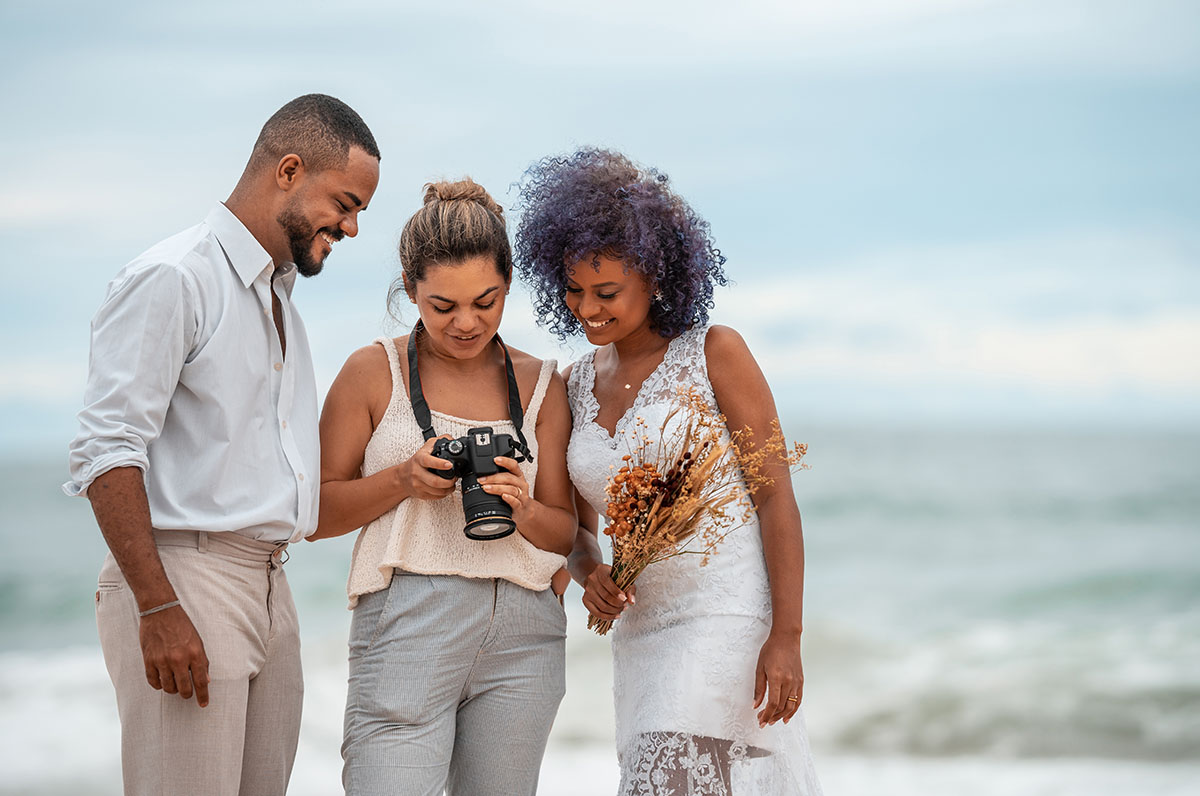
For many couples, one of the biggest items on your wedding planning checklist is hiring a photographer. You’ll be reminiscing on your wedding photos for years to come, so it’s important to find a photographer whose style—and personality—you love! Finding the right person to capture your special day can feel overwhelming, but interviewing them beforehand is key to ensuring a positive experience.
Research and browse social media to narrow your decision down to a handful of photographers, then reach out to schedule brief in-person or phone interviews. From there, we’ve compiled this list of essential questions to ask wedding photographers to see if they’re a good fit for your wedding.
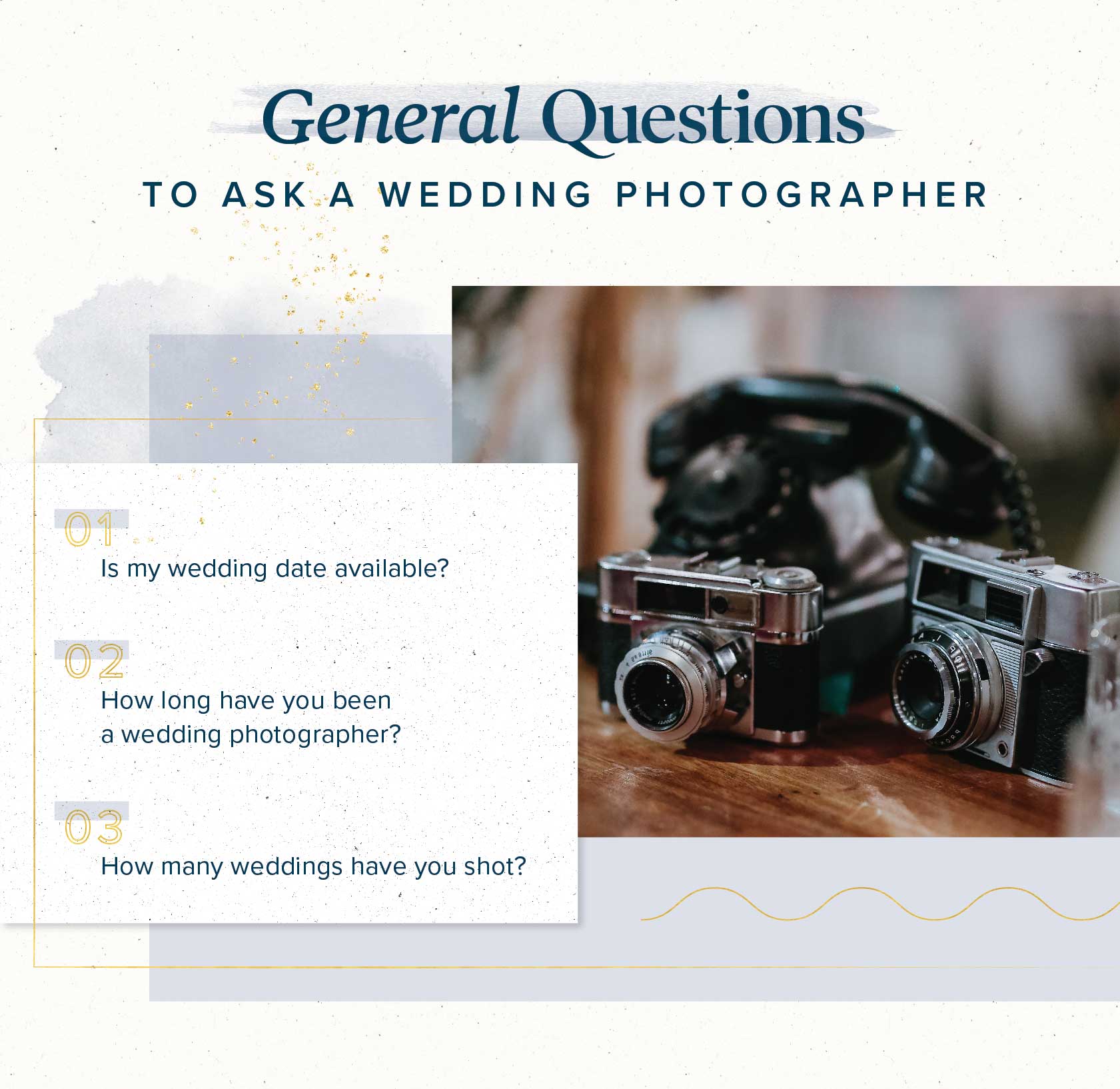
1. Is My Wedding Date Available?
You don’t want to get your hopes up only to find out your dream photographer isn’t even available on your special day. Be sure to check their availability upfront to avoid this.
2. How Far in Advance From the Wedding Date Do You Require Bookings?
Some photographers take last-minute bookings, while others require you to book weeks or months in advance. If you’re still considering other photographers, it’s important to keep this information in the back of your mind.
Once you’re ready to make a decision, you’ll have an idea of the best time to reach out to secure your date.
3. How Many Weddings Have You Photographed?
When it comes to capturing your special day, you’ll want to find a photographer who specializes in weddings. This is because wedding shoots typically require more time, skill, and advanced equipment than other types of sessions.
4. Can You Share a Full Gallery of a Recent Wedding You Shot?
You can get a taste of a photographer’s work by viewing their social media pages, but you’ll get a clearer picture of their ability by viewing a full gallery of a recent wedding shoot. Not all photographers will be willing to do this, but it can’t hurt to ask.
5. Have You Shot At Our Venue Before? If Not, Are You Willing to Check Out the Venue in Advance?
Finding a photographer who has shot at your venue before is a huge plus, since they’ll already be familiar with the layout, lighting, and other elements that can help them capture the best shots. If they’ve never shot at your wedding location, ask if they’d be willing to visit the venue prior to your wedding date.
6. Can You Provide Any References or Client Testimonials?
Ask if your photographer has any testimonials to get an idea of whether previous clients felt satisfied with the experience and their final photos.
While they may capture the most beautiful, eye-catching photos, if your photographer has horrible customer service skills, you might be in for a rough time on your wedding day. Getting references from previous clients can give you peace of mind that your photographer is pleasant to work with and maintains professionalism in their services.
7. How Long Have You Been a Wedding Photographer?
When it comes to wedding photography, there are certain skills that can only be learned through time and experience. Asking your photographer how long they’ve been shooting weddings is a good way to gauge their ability and expertise.
Hiring a photographer who’s been shooting weddings for years is likely to deliver better results than hiring one who’s just stepping foot in the industry.
8. Have You Shot Any Weddings With a Similar Size and Style to Ours?
Having a photographer who’s shot similar wedding styles can put you at ease knowing you’ll be happy with the final result. It can also be helpful to know the size of weddings they typically shoot and how it compares to the size of your wedding.
9. Do You Have Any Work History With Our Wedding Planner or Videographer?
Your photographer, wedding planner, and videographer will all be working in tandem to ensure your special day runs smoothly. If they’ve already collaborated together successfully in the past, that’s a big plus.
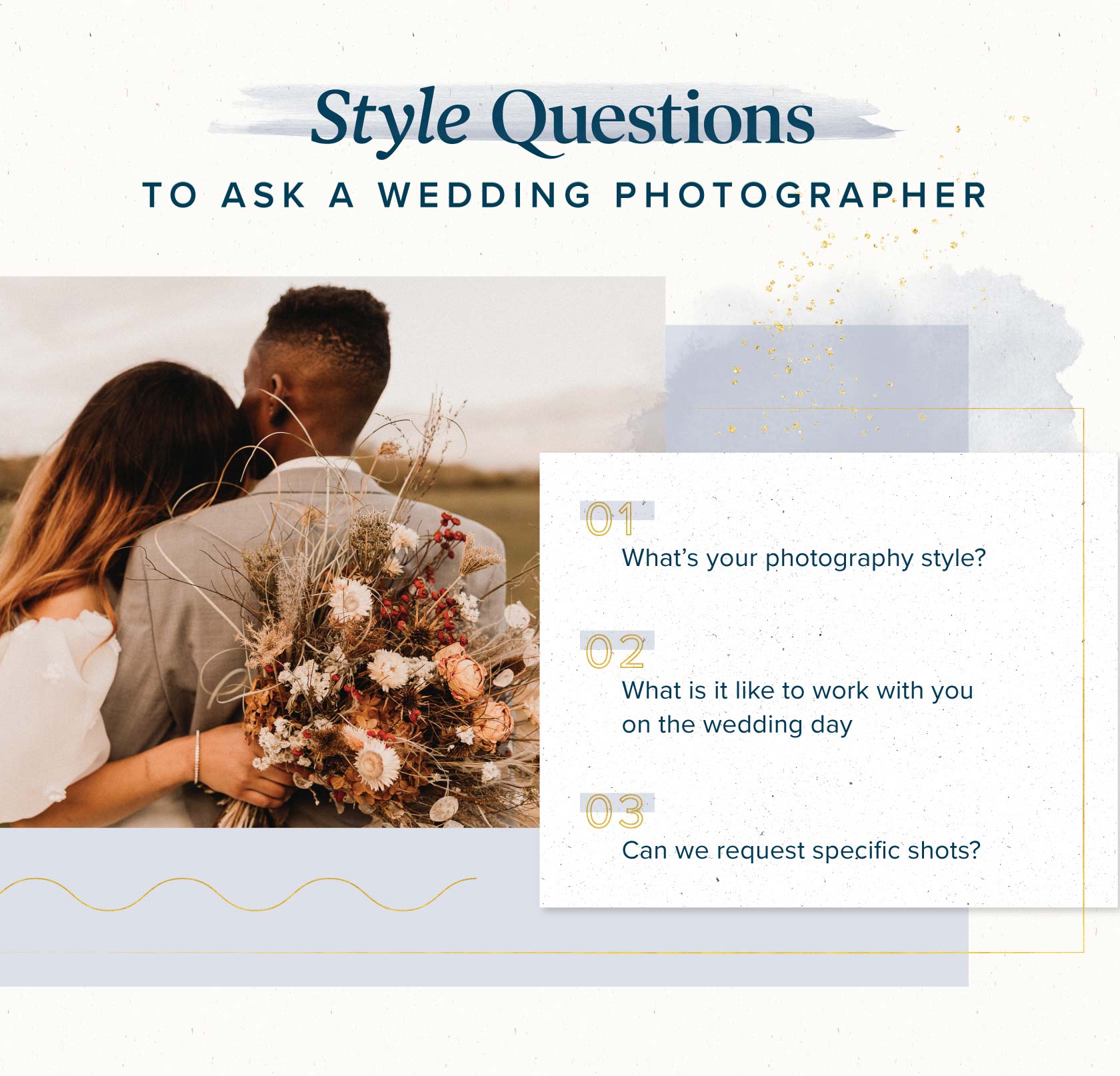
10. What’s Your Working Style on the Wedding Day?
This is one of the more fun questions to ask a photographer that can lend some insight into their personality. You’ll be spending the whole day with your photographer, so hiring someone you feel comfortable around can make or break your experience.
Ask them questions like whether they prefer to blend into the background on the big day, or if they prefer more visibility and involvement in order to capture the best shots. Then consider whether their working style aligns with what you’re looking for in a photographer.
11. How Would You Describe Your Photography Style?
Maybe you already have a good idea of what wedding photography styles are your favorite. Before interviewing a photographer, check out their website and social media for a glimpse into their style and see if it matches what you like.
It’s also a good idea to ask them how they would describe it in their own words. For example, some photographers capture mostly posed portraits, while others prefer a more candid approach.
12. What’s Your Editing Style Like?
Your photographer’s editing style will play a big part in how your final images turn out. Some photographers like to create a bright and airy feel with their edits, while others prefer a warm and moodier tone to their photographs.
It’s important to make sure you like the photographer’s editing style, especially since many contracts limit or prevent you from re-editing the images on your own.
13. Do You Specialize in Indoor or Outdoor Weddings, or Both?
The skills and equipment needed to shoot an indoor wedding vs. an outdoor wedding varies more than you might think! Make sure your photographer has experience shooting in the setting you’ll be in on your wedding day. If you’re having a partially indoor and outdoor wedding, make sure they have experience with both.
14. Do You Shoot in Other Formats Like Film?
If you want a little extra flair in your wedding gallery, consider asking your photographer if they shoot in other formats like film. Compared to digital photography, color variations in film are more vivid and come together to create a rich and unique result.
15. Can We Request Specific Shots?
You probably have a handful of dream photos that you want to have in your wedding gallery. It’s a good idea to ask your photographer if it’s possible to recreate these specific shots.
Finding a photographer who is willing to take your unique desires into consideration is key to having your special day documented the way you envisioned.
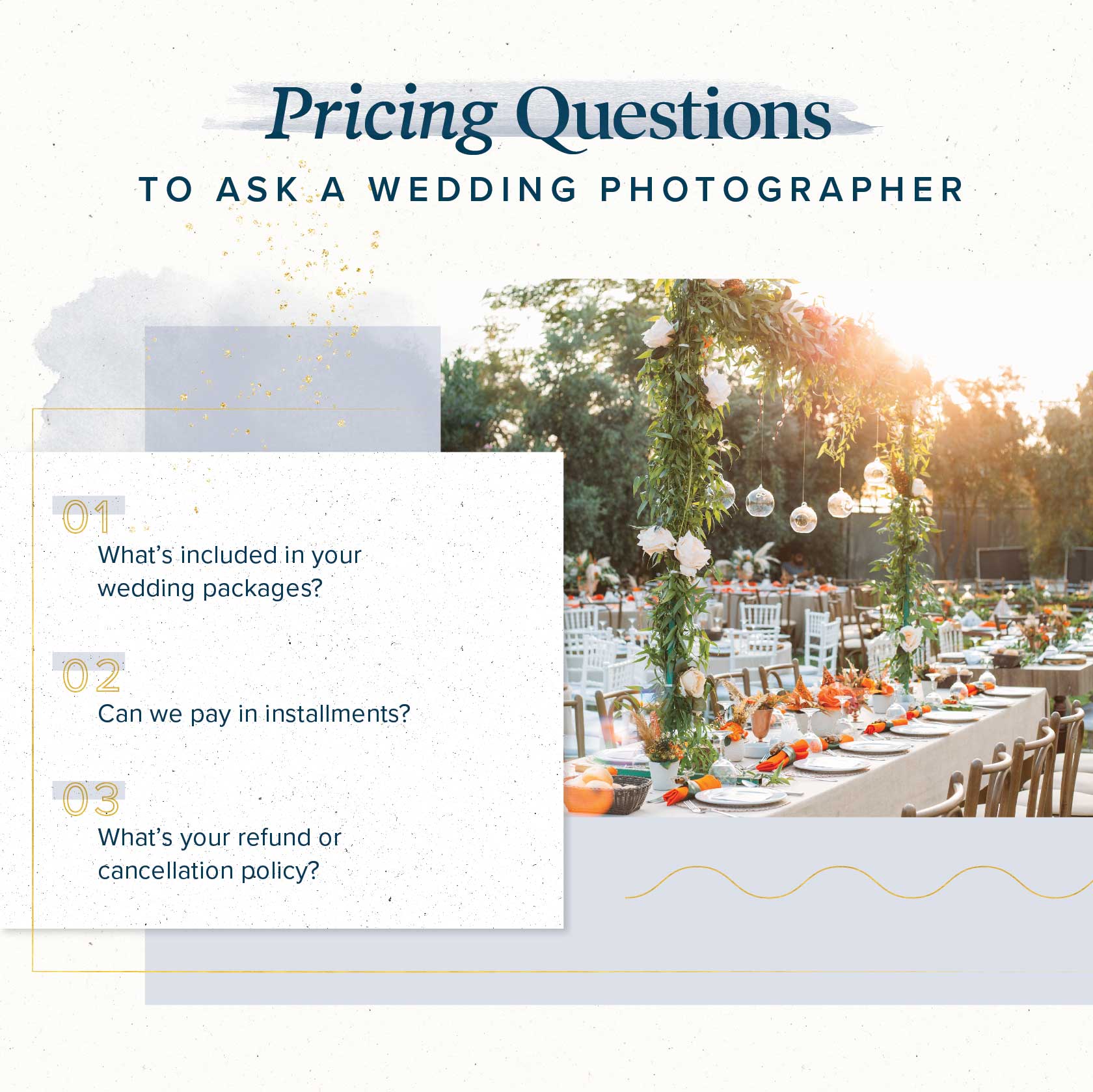
16. What’s Included in Your Wedding Packages?
Before you book a photographer, get clear on their pricing structures and any packages they offer. Be sure to ask about the specifics included in each package, like the number of hours included, how many final images you’ll receive, and if there are any add-ons available.
17. Can Your Packages Be Customized?
Sometimes the wedding packages a photographer offers don’t really fit what you need. If this is the case, ask if they’re willing to customize their packages to align with your unique needs and budget.
18. How Many Hours Are Included In Your Packages?
If you only want your ceremony and reception photographed, a package offering between four and six hours of shooting will likely be enough. However, if you want the photographer to capture everything from when you start getting ready or you want to set aside time to capture first-look photos, eight or more hours of coverage will likely be needed.
19. Can You Also Shoot Pre-Wedding Events like the Rehearsal?
If you want to document pre-wedding events like the rehearsal or even bachelor or bachelorette parties, be sure to discuss this with the photographer beforehand. See if the cost is included in the wedding package or if you’ll need to pay extra.
20. Do You Require a Deposit?
One of the most important questions to ask your wedding photographer is if a deposit payment will be required to secure your wedding date. Be sure to ask how much the deposit costs, when it’s due, and whether or not it’s refundable.
21. What Are Your Travel Fees, If Any?
Many photographers who have to travel a long distance to your wedding destination will charge additional fees to cover their travel expenses. If you’re considering hiring an out-of-town or even out-of-state photographer, make sure to discuss this so you aren’t caught by surprise.
Ask whether they charge a travel fee, how much it costs and for what distance, and what the fee covers—such as gas mileage and room and board.
22. How Much Do Overtime Hours Cost?
If your reception ends up running longer than expected, you want to be sure that your photographer will be there to capture those moments. Don’t forget to discuss pricing for overtime hours so you don’t go over your budget.
23. Can We Pay in Installments?
Hiring a professional wedding photographer can get pricey, but you get what you pay for! If paying in full isn’t feasible for you, inquire about whether you can set up installment payments instead. Most photographers are empathetic and understand that paying upfront might be difficult if you’re on a strict budget.
24. Do You Provide Corrective Services like Retouching?
If you’re interested in retouching services like evening skin complexion or smoothing flyaway hairs, be sure to ask if that’s something the photographer offers (and if there’s an additional charge). Every photographer’s editing philosophy is different. Some photographers offer minor retouching for free but charge extra for any major corrections.
25. What Is Your Refund or Cancellation Policy?
It’s always a good idea to inquire about refunds and cancellations before signing a contract. Make sure to discuss the cancellation policy and whether or not you’ll be able to get a refund for your deposit and any payment installations.
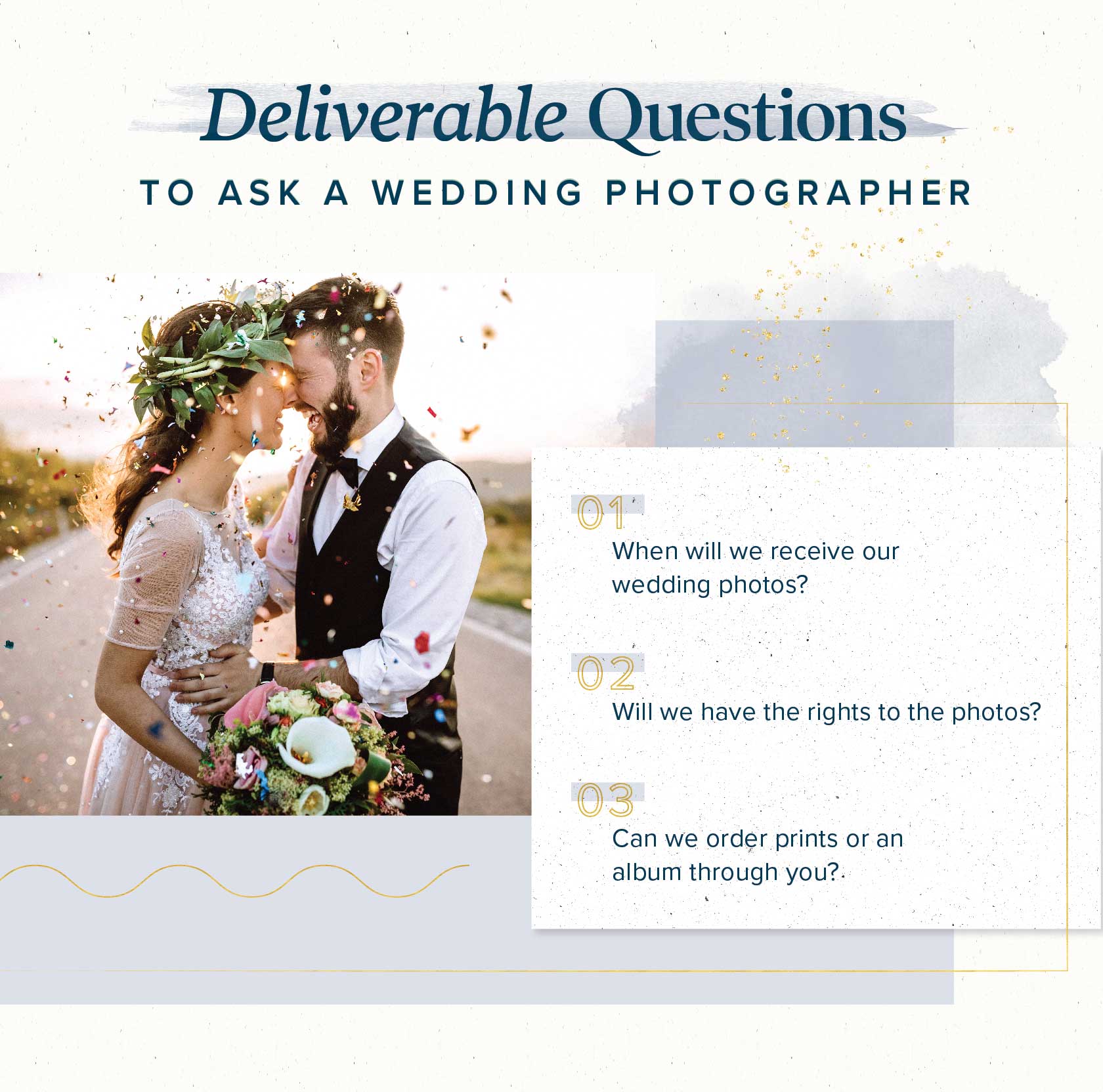
26. What’s the Timeline for Delivering the Wedding Photos?
Depending on how busy your photographer is and how in demand their services are, you can usually expect to receive your full wedding gallery three to six weeks after your wedding day. Ask your photographer what their typical turnaround time is for galleries so you have a realistic expectation upfront. Some photographers may even allow you to pay a rush fee if you want to get your photos back quicker.
27. How Many Final Images Will I Receive?
Discuss with your photographer how many images they plan to deliver in your final wedding gallery. Keep in mind that the longer your wedding, the more images you will likely receive.
Receiving 50-100 photos per hour of coverage is usually the norm when it comes to wedding photography. For a standard eight hours of wedding coverage, you should receive between 400 and 800 images, but this can vary between photographers.
28. Can You Assist With Selecting Images Once We Receive the Full Gallery?
If your photographer allows clients to select their favorite images out of the gallery to download or print, ask if they can assist with this process. They’ll have a better idea of which images will be the best for an album or prints.
29. How Do You Share Access to the Photos?
Most wedding galleries are delivered in a digital format. Your photographer may send your photos through an online service like WeTransfer, Dropbox, or ShootProof. Be sure to ask if there’s a time limit for how long you’re able to download the photos and if there’s a fee to retrieve the images after that date.
You might also have the option of purchasing a flash drive with your wedding photos already downloaded onto it.
30. Will We Have the Rights to the Photos?
Most photographers will retain the copyright to photos they’ve taken while giving you a license to print and publish the images. However, this license may have some restrictions that prevent any further editing or retouching of the photos.
Discuss what rights you’ll have to the photos and watch out for language in the contract that states you need permission to use your wedding images.
31. Do You Provide Unlimited Downloads of the Final Images?
Discuss with your photographer whether they allow unlimited downloads from the final gallery or only a certain number. If you have friends or family members who also want the photos, be sure to ask if multiple people are allowed to download the files.
32. Do You Provide the Raw Image Files?
Raw files are images straight out of the camera with no compression, editing, or retouching applied. It’s standard practice in the industry for photographers not to give out raw image files to clients. There are a couple reasons for this: First, raw image files are very large and can’t be opened without special editing software. Second, since raw files are completely unedited, they may not match the photographer’s style or look as professional as their retouched images.
If you really want the unedited images, discuss this with your photographer upfront. They may give you access to the raw files for an additional fee.
33. Can We Order Prints from You?
If you plan to order prints of your wedding images, the process is often easier if you can order them straight from your photographer rather than going through a third party. They’ll be able to walk you through the process from start to finish and suggest the best images for printing.
34. Can We Order Albums from You?
Just like with prints, if you want an album of your wedding gallery, the process is typically smoother if you go through your photographer instead of a third party. Discuss if they offer albums and how much they cost.
35. Do You Offer Album Design Assistance?
If you can’t order an album through your wedding photographer directly, ask if they offer assistance with designing the album through a third party. Be sure to discuss any fees associated with these services.
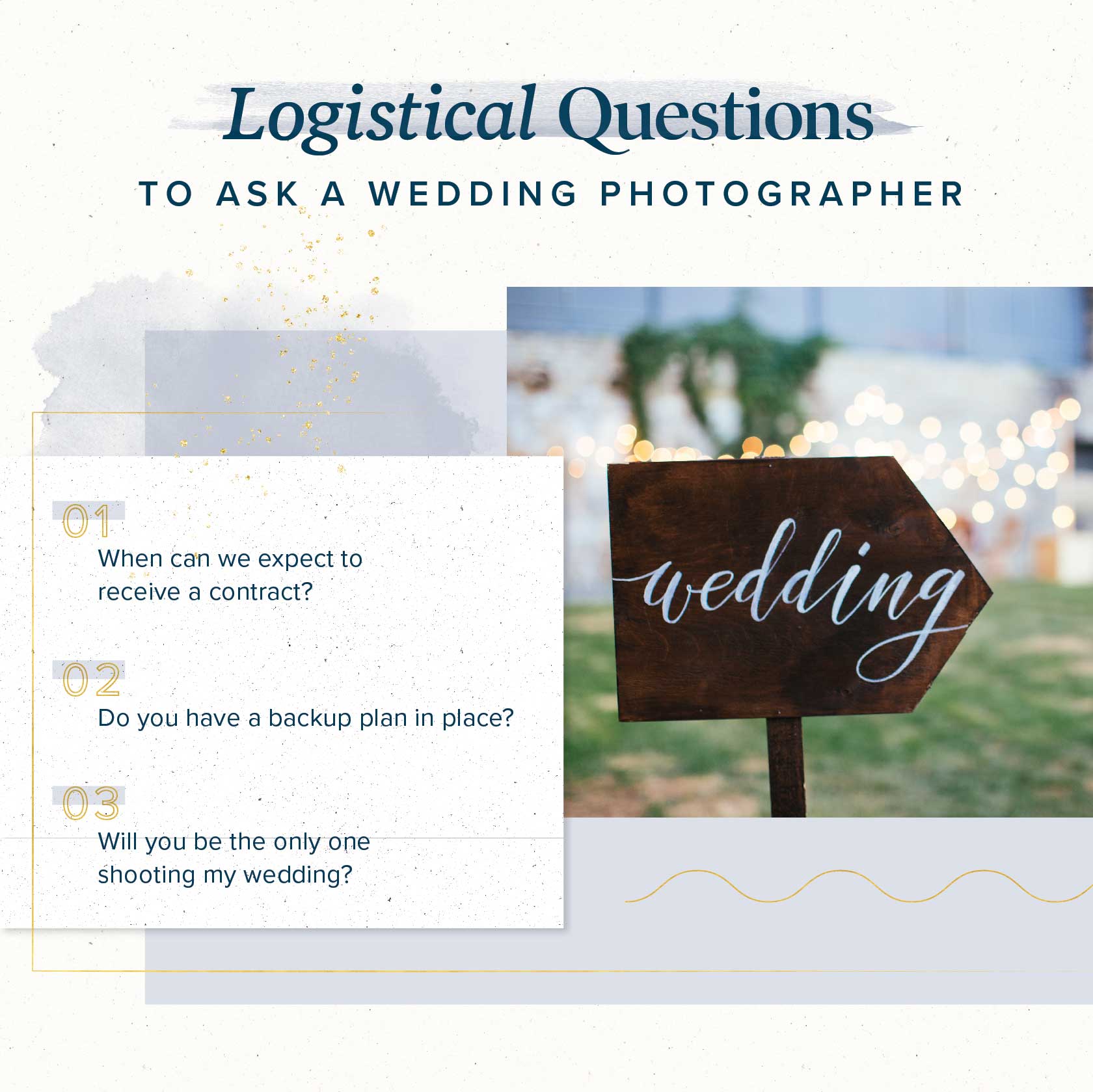
36. When Can We Expect to Receive a Contract?
Find out when you can expect to receive a contract and when it’s due back with your signature. Make sure this time frame allows you enough time to read the contract thoroughly before signing.
Avoid any photographer who says they don’t send a contract! Having a legal agreement protects both you and the photographer from getting scammed.
37. Do You Carry Liability Insurance?
Discuss with your photographer whether or not they carry liability insurance, which protects them from lawsuits in the event of injuries or property damage. Many venues require their vendors to carry liability insurance, so this is definitely something you want to consider before signing a contract.
38. Will You Have a Backup Plan in Place?
Ask whether they have a backup plan in place in the event that they’re unable to photograph your wedding due to sickness or another unexpected circumstance. In these situations, many photographers outsource the shooting to another local photographer with a similar style. Then they’ll edit the images to add their special touch to the final product.
39. Will You Be the Only One Shooting My Wedding? Do You Have Assistants?
Want to make sure every moment—both big and small—is captured on your wedding day? Hiring a photographer who will bring along a secondary photographer or photography assistant will ensure that nothing is left undocumented. This also means you’ll get a variety of different shots and angles when you say “I do.”
40. Will You Be Shooting Any Other Weddings That Weekend?
Ideally, you want your photographer to have the entire weekend free to focus on your wedding. That way, they’ll be able to dedicate all of their attention to your big day rather than balancing multiple events. However, it’s not necessarily a deal-breaker if they have another wedding booked if the venues are a reasonable distance from each other.
41. Do You Carry Backup Equipment?
There’s always the possibility that equipment will fail. The last thing you want is for your photographer to miss out on tons of great shots because their camera broke! This is why having a photographer who’s prepared for these situations is so important.
Before you start sending out those save the dates, you need to hire a photographer—which can be a stressful and time-consuming process. To help, browse our list of wedding photographers that you can filter by price, availability, photography style, and photo format.
Now that you’re armed with our list of essential questions to ask wedding photographers, you’re ready to find your perfect match! Once you’ve chosen the perfect person to capture your special day, the next step is to reach out to discuss how to book them.
And if you need support finding the rest of your wedding vendors, we’ve got that covered, too—head to our vendor page to find local vendors that fit your budget, location and style.

- Expert advice/
- Venues & vendors/
- Photos & video/
- 41 Questions to Always Ask Wedding Photographers
Find even more wedding ideas, inspo, tips, and tricks
We’ve got wedding planning advice on everything from save the dates to wedding cakes.